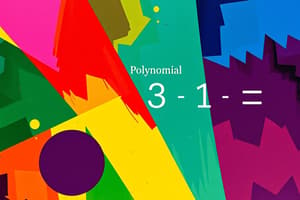Podcast
Questions and Answers
What is the product of (2x - 3y)(4x - y)?
What is the product of (2x - 3y)(4x - y)?
- 8x^2 - 12y + 3y^2
- 8x^2 - 14y + 3y^2 (correct)
- 8x^2 + 14y + 3y^2
- 12x^2 - 5xy + 3y^2
What is the product of (ab - 9)(ab + 8)?
What is the product of (ab - 9)(ab + 8)?
- a^2b^2 - ab + 72
- a^2b^2 + ab + 72
- a^2b^2 - ab - 72 (correct)
- a^2b^2 + ab - 72
What is the product of (x^2 + 2x - 1)(x^2 + 2x + 5)?
What is the product of (x^2 + 2x - 1)(x^2 + 2x + 5)?
- x^4 + 4x^3 + 8x^2 + 8x - 5 (correct)
- x^4 + 4x^3 + 8x^2 - 5
- x^4 + 4x^3 + 6x^2 + 8x - 5
- x^4 + 6x^3 + 12x^2 - 5
What is the product of (a - b)(a^2 + ab + b^2)?
What is the product of (a - b)(a^2 + ab + b^2)?
What is the product of (x + y + 3)(x + y - 4)?
What is the product of (x + y + 3)(x + y - 4)?
What is the product of (a + 3)(a - 2)?
What is the product of (a + 3)(a - 2)?
What is the product of (3m^3 - 1/2y)(3m^3 - 1/2y)?
What is the product of (3m^3 - 1/2y)(3m^3 - 1/2y)?
What is the product of (a + b - c)(a + b + c)?
What is the product of (a + b - c)(a + b + c)?
What is the product of [4 - (3c - 1)][6 - (3c - 1)]?
What is the product of [4 - (3c - 1)][6 - (3c - 1)]?
What is the product of (m^3n + 8)(m^3n - 5)?
What is the product of (m^3n + 8)(m^3n - 5)?
What is the product of (a + b)(a^2 - ab + b^2)?
What is the product of (a + b)(a^2 - ab + b^2)?
What is the product of (3xy - 1)(4xy + 2)?
What is the product of (3xy - 1)(4xy + 2)?
What is the product of (3 - c^2d)(4 - 4c^2d)?
What is the product of (3 - c^2d)(4 - 4c^2d)?
What is the product of (1 - 7x)(1 + 9x)?
What is the product of (1 - 7x)(1 + 9x)?
Flashcards are hidden until you start studying
Study Notes
Multiplying Polynomials Overview
- Multiplying polynomials involves using the distributive property to expand expressions.
- The process can result in different polynomial forms depending on the terms involved.
Specific Examples of Polynomial Multiplication
- (2x - 3y)(4x - y) results in 8x^2 - 14xy + 3y^2.
- (ab - 9)(ab + 8) expands to a^2b^2 - ab - 72.
- (x^2 + 2x - 1)(x^2 + 2x + 5) leads to x^4 + 4x^3 + 8x^2 + 8x - 5.
- (a - b)(a^2 + ab + b^2) simplifies to a^3 - b^3, showcasing the difference of cubes.
- (x + y + 3)(x + y - 4) results in x^2 + 2xy + y^2 - x - y - 12.
- (a + 3)(a - 2) expands to a^2 + a - 6.
Higher Degree Polynomials
- (3m^3 - 1/2y)(3m^3 - 1/2y) produces 9m^6 - 3m^3y + 1/4y^2 indicating squared polynomials.
- (a + b - c)(a + b + c) results in a^2 + 2ab + b^2 - c^2, visually representing a difference of squares.
Complex Expressions
- [4 - (3c - 1)][6 - (3c - 1)] expands to 9c^2 - 36c + 35, demonstrating a composite structure.
- (m^3 n + 8)(m^3 n - 5) simplifies to m^6n^2 + 3m^3n - 40, highlighting multi-variable interactions.
- (a + b)(a^2 - ab + b^2) gives a^3 + b^3, illustrating the sum of cubes.
Additional Calculations
- (3xy - 1)(4xy + 2) results in 12x^2y^2 + 2xy - 2, representing the multiplication of polynomial pairs.
- (3 - c^2d)(4 - 4c^2d) begins a calculation that shows resulting products from combining different variable factors.
- (1 - 7x)(1 + 9x) triggers further exploration and expansion, stressing the importance of systematic polynomial multiplication.
Techniques and Tips
- Organize terms in descending order for clarity in presentation.
- Double-check coefficients and signs during the distribution process to avoid errors.
- Practice with different polynomial types to enhance familiarity with various multiplication scenarios.
Studying That Suits You
Use AI to generate personalized quizzes and flashcards to suit your learning preferences.




